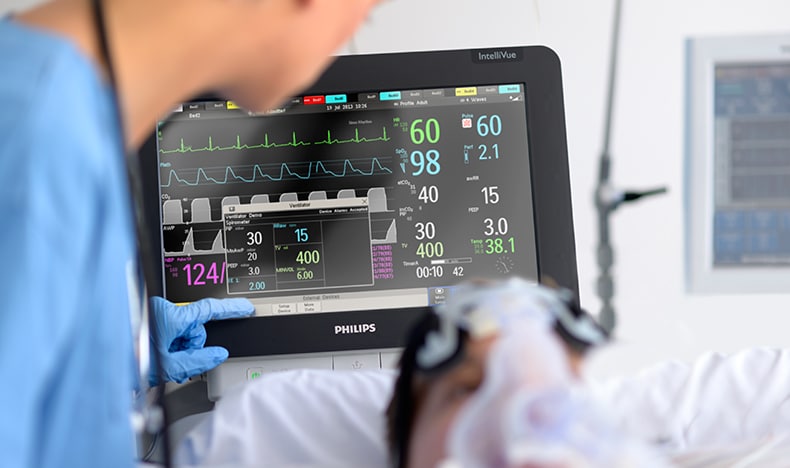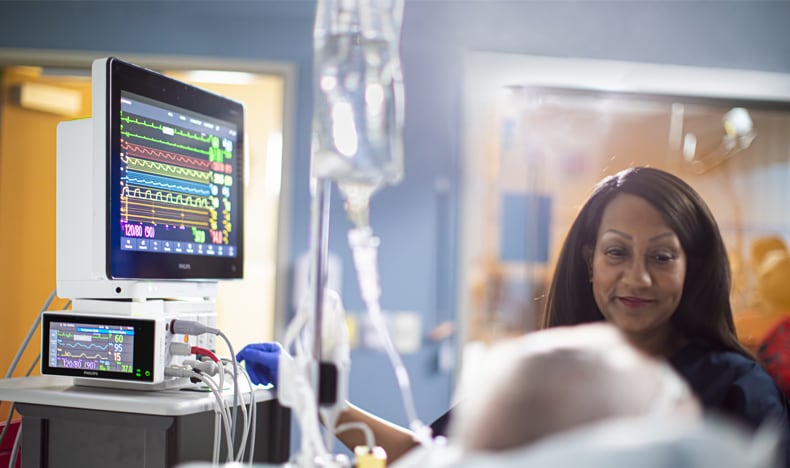Monitoring solutions can help Jackson Health System reduce its carbon footprint
By Philips editorial team ∙ Jun 06, 2025 ∙ 3 min read
A retrospective sustainability study at Jackson Health System found that EcoDesigned patient monitors could reduce carbon emissions by 47%, with additional significant environmental and financial savings in disposable batteries and paper.
Case study at a glance
Partner
Jackson Health System
Challenge
Climate change poses a serious threat to human health and creates a pressing need for resilient and sustainable healthcare models. Based in Florida, Jackson Health System is committed to sustainable practices, including through their commitment to Environmentally Preferred Purchasing guidelines.
Solution
After installing new patient monitors through an Enterprise Monitoring as a Service (EMaaS) partnership, Jackson and Philips studied the sustainability benefits.
Results
Data from a Life Cycle Assessment indicates the EcoDesign monitoring solution could reduce the combined carbon emissions at three Jackson hospital locations by 47% compared to previous systems. Additionally, data indicates the replacement of monitors could eliminate the need for 420,000 disposable AA batteries and 6.5 million sheets of paper, saving $1.2 million over a 10-year device lifetime.

The challenge
The healthcare sector significantly impacts the environment: it accounts for 4.4% of global CO2 emissions and 10% of global materials used each year, and 71% of the sector’s emissions are scope 3 emissions, primarily from the healthcare supply chain 1,2. The threat of climate change has created a pressing need to build resilient and sustainable healthcare models. Jackson Health System understands the importance of taking care of the environment and is committed to being good citizens of the community. With its location in southern Florida, the firsthand real effects of climate change happening today are evident. Dubbed the “ground zero” for climate change, low-lying Miami faces greater flood risk and infrastructure challenges, and up to 92% of the Miami-Dade County population may be impacted by either flooding or inundation by 3 meters of sea-level rise 3,4. Jackson Health System began to implement a sustainable solution for managing its hospital waste in 2012 and has recently been recognized for its sustainability programs 5,6. Jackson continues prioritizing sustainable procurement practices and is deliberate with the lifecycle management of their technology. This project with Philips reflects one step further in Jackson’s ongoing commitment to reducing its environmental impact and promoting sustainability, while delivering high-quality care to patients. With a close working relationship since 2007, Philips and Jackson formalized a strategic partnership in 2018 that included the Philips Enterprise Monitoring as a Service (EMaaS) model 7,8. This partnership expanded to include the replacement of physiological monitors across Jackson’s hospitals and outpatient care centers. As part of the transition to Philips monitoring solutions, the health system decided to also quantify the sustainability benefits at three of its larger facilities.

“At Jackson Health System, we are committed to sustainable practices that support human and environmental health, and better patient care,” said Rosa Costanzo, Chief Supply Chain and Procurement Officer at Jackson Health System. The commitment to EcoDesign, circularity and sustainable innovation means that Philips monitoring devices, systems and services are increasingly designed to use less energy and materials during the use phase. Additionally, they improve parts recovery and recyclability of monitors at the end of their life through take-back programs. Philips has been carbon neutral in its operations since 2020, and works closely with suppliers and customers towards ambitious targets to reduce the environmental impact of the supply chain. This partnership with Jackson Health System is an example of how Philips is well-positioned to bring expertise in innovation and in-depth experience in driving and embedding sustainability as part of day-to-day business operations, to help decarbonize the industry and deliver better care to more people.
Approach
To measure the environmental impact of transitioning to Philips monitoring solutions, Philips and Jackson Health conducted a collaborative Life Cycle Assessment (LCA). This is a standardized science-based methodology to evaluate the environmental and social impacts associated with a product or service through the various phases of its life cycle. The study included three acute care facilities: Jackson Memorial Hospital, Jackson North Medical Center and Jackson South Medical Center. These locations have implemented Philips monitoring solutions over three phases, beginning in 2019. The LCA was conducted using data collection, onsite interviews and analysis to quantify waste avoided and savings. The LCA evaluated 2,887 bedside, telemetry, transport and spot-check monitors, assessing environmental impacts from production to disposal, including resource extraction, manufacturing, transportation, usage, and end of life. Additionally, the study evaluated the elimination of disposable AA batteries and the decrease in paper usage.
Outcomes
Using EcoDesigned Philips IntelliVue and EarlyVue monitors could enable Jackson to reduce its carbon emissions across the three locations by 685.1 tons of CO2e – a decrease of 47% compared to previous systems, according to the LCA data. The data indicates that the replacement of telemetry monitors could eliminate the need for an estimated 420,000 disposable AA batteries, and the combination of bedside and telemetry monitoring could save 6.5 million sheets of paper, allowing the health system to save approximately $1.2 million over a 10-year device lifetime.
Being able to see the extent to which Jackson Health System can reduce our emissions and use of resources illustrates that our sustainable procurement policies are the right approach to improve our community. Jackson is committed to lead the way in sustainability, and this is one example of how we are driving change.
“We suspected that changes in our monitoring systems and operations could reduce our environmental impact, so it’s heartening to actually quantify that,” said Elizabeth Joseph, Clinical Educator and Chair of Jackson Health System’s Clinical and Climate Committee. “Being able to see the extent to which Jackson Health System can reduce our emissions and use of resources illustrates that our sustainable procurement policies are the right approach to improve our community. Jackson is committed to lead the way in sustainability, and this is one example of how we are driving change." ”Added Marta Vigil-García, Sustainable Healthcare Consultant at Philips: “Since there isn’t a lot of data on healthcare emissions available yet, we are conducting studies like this for the first time. We hope seeing real reductions in carbon and materials will inspire others in the industry to adopt more sustainable practices.”

Before replacing the monitoring systems, Jackson clinicians printed paper wavestrips multiple times a day per patient and then manually scanned them into their electronic medical record. The previous telemetry monitors were powered by disposable AA batteries, requiring hundreds of replacements each week. In contrast, the workflow implemented by Philips utilizes digital, automated wavestrip exported to the EMR, eliminating paper waste while freeing clinicians to spend more time with patients. At Jackson, Philips telemetry monitors are powered by rechargeable lithium-ion batteries. Data from the LCA indicates that the newly designed Philips IntelliVue and EarlyVue monitors could help reduce the health system’s patient monitoring carbon footprint by 508 tons of CO2e across the lifecycle, while the battery and paper savings from the telemetry monitors could reduce CO2e by an additional 177.1 tons. Jackson has also traded in its older telemetry monitors to AllParts Medical, a division of Philips, for parts refurbishment, reuse and responsible recycling, promoting circularity to ensure nothing is sent to landfill. The health system has also been working with a partner to recycle 100% of its paper and batteries. “By transitioning to Philips patient monitors, we have been able to reduce our carbon footprint and bring lasting benefits, reducing our material usage, while generating cost savings,” said Costanzo. “This assessment illustrates that health systems can balance the need for advanced technology with environmental sustainability, without compromising on delivering high-quality patient care.” * Results from case studies are not predictive of results in other cases. Results in other cases may vary. * The LCA results are obtained using Philips Environmental Profit & Loss (EP&L), proxy data, literature and customer obtained data. The LCA is not validated externally by 3rd party.
Sources
[1] Health Care Without Harm. Health care climate footprint report (2019). [2] Circle Economy. The Circularity Gap Report 2020. [3] WWF. Miami Rising Up. [4] Environmental Research Letters. Modes of climate mobility under sea-level rise. [5] Jackson Health System. Jackson Health System Keeps Waste From Landfills. [6] Jackson Health System LinkedIn. [7] Philips. Philips and Jackson Health System Sign Groundbreaking 11-year Agreementfor Enterprise Monitoring as a Service. [8] Enterprise Monitoring as a Service (EMaaS) is a subscription-based solution that provides healthcare organizations with integrated patient monitoring technology and services to enhance patient care and streamline hospital operations.







